Washima Mede, CEO of Prado Power in Nigeria discusses the work his company does in northern Nigeria.
Why do you personally work in renewable energy?
I work in renewable energy to change the energy access narrative in Nigeria and Sub-Saharan Africa. I also work in this space to rebuild our communities, providing excellent solutions for all.
I am from Benue State, in the North Central Part of Nigeria. I grew up experiencing electricity outages that would last in some cases for years, even though I lived in the state capital, Makurdi. During my Engineering Master’s Degree at the University of Portsmouth, I was exposed to the concept of sustainable development as defined at the Brundtland Commission as “solutions that meet the requirements of the current generation without compromising the ability of future generations to meet their own needs” and separately to solar technology. Following this, I thought that I could do something about the power supply challenges that were prevalent in Nigeria.
I have also been to and lived in some of the places we work. Benue state is home for me. Benue state is also known as the “food basket of Nigeria” due to its very fertile soil for agriculture and is home to a young and energetic population, most of whom engage in agriculture for sustenance. Additionally, Niger state was home during my undergraduate degree in civil engineering.
Overall, I connect with most of our customers and understand the challenges they face, namely not being able to get ahead because of lack of basic necessities like energy access.
How does your company engage with local communities?
We engage with communities via initial discussions with the community leaders. We engage with most of the general population in the communities via town hall meetings and focus group discussions to understand their needs even beyond energy access.
Tell us about a recent or upcoming project. What is most compelling about it?
We are currently prospecting 35 new communities for mini-grids and productive use agricultural hubs. These communities are last mile communities in some of the hardest to reach areas.
For this project, we are optimizing our model to ensure that beneficiaries of energy access and productive use appliances are evenly split across gender lines. This is to ensure an inclusive intervention and to create equal opportunities for all in the communities.
How can/do “Peace RECs” support your project development?
By signing forward contracts on the sale of renewable energy credits, we are able to provide additional benefits of water access, community lighting or fully equipped agricultural productive use hubs for smallholders in these communities.
What impacts does renewable energy have in the communities where you work?
Energy stimulates development and provides hope to people who would otherwise be unable to escape the quagmire of poverty. By providing these solutions, we make smallholder agriculture sustainable (through agricultural processing) and we are able to enhance food security in the region.


